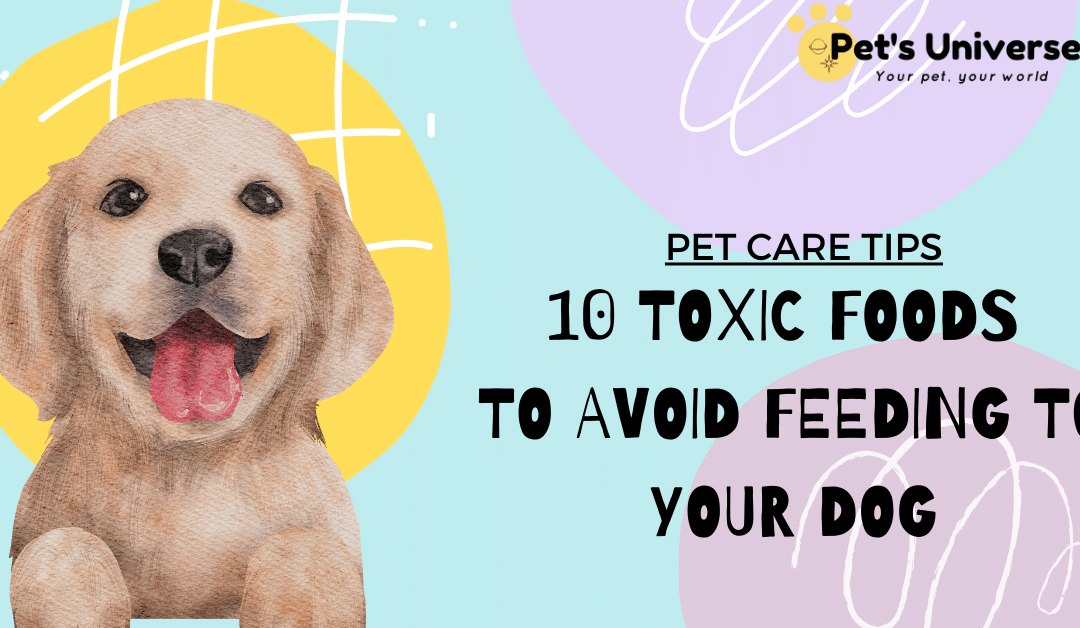Pet care tips: 10 Toxic foods to avoid feeding to your dog
Dec 20, 2022 | All Posts, Dogs |

Pets, particularly dogs, are often treated as members of the family and given a wide variety of foods to eat. However, it’s important to remember that not all human foods are safe for dogs to consume. In fact, some foods can be toxic and even deadly for dogs. As a responsible pet owner, it’s important to familiarize yourself with the foods that can be harmful to your furry friend and to make sure to keep them out of reach.
Here are some toxic foods to avoid feeding your dog:
1. Chocolate: Chocolate contains theobromine, which can be toxic to dogs in large quantities. The darker and more bitter the chocolate, the higher the theobromine content and the greater the risk of toxicity. Symptoms of chocolate poisoning in dogs include vomiting, diarrhea, tremors, rapid breathing, and an irregular heartbeat.
2. Grapes and raisins: Grapes and raisins can be toxic to dogs, even in small quantities. Symptoms of grape and raisin poisoning include vomiting, diarrhea, lethargy, and abdominal pain. In severe cases, kidney failure can occur.
3. Onions and garlic: Onions and garlic contain compounds that can damage a dog’s red blood cells, leading to anemia. Symptoms of onion and garlic poisoning include vomiting, diarrhea, weakness, and breathing difficulties.
4. Alcohol: Alcohol can be toxic to dogs, even in small amounts. Symptoms of alcohol poisoning in dogs include vomiting, diarrhea, difficulty breathing, tremors, and in severe cases, coma or death.
5. Avocado: Avocado contains persin, which can cause vomiting and diarrhea in dogs. The pits of avocados can also be a choking hazard.
6. Macadamia nuts: Macadamia nuts can cause tremors, fever, and difficulty walking in dogs. Symptoms usually appear within 12 hours of ingestion and can last for up to 48 hours.
7. Xylitol: Xylitol is a sugar substitute that is toxic to dogs. Even small amounts of xylitol can cause a rapid insulin release in dogs, leading to hypoglycemia (low blood sugar). Symptoms of xylitol poisoning include vomiting, loss of coordination, and seizures.
8. Cooked bones: Cooked bones can splinter and cause blockages or tears in a dog’s digestive system. Stick to giving your dog appropriate chew toys and raw bones.
9. Fatty foods: Foods high in fat, such as bacon, can cause pancreatitis in dogs. Symptoms of pancreatitis include vomiting, diarrhea, abdominal pain, and lethargy.
10. Caffeine: Caffeine can be toxic to dogs and can cause symptoms such as restlessness, rapid breathing, heart palpitations, and muscle tremors.
It’s always best to err on the side of caution when it comes to feeding your dog. If you suspect that your dog has ingested a toxic food, contact your veterinarian or the ASPCA Animal Poison Control Center (APCC) immediately. The APCC is available 24/7 to answer your questions and provide treatment recommendations.
By following these pet care tips and avoiding feeding your dog toxic foods, you can help keep your furry friend happy and healthy.
